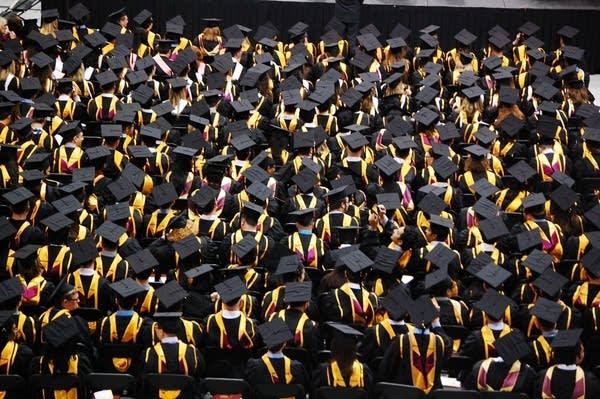University of Minnesota seeks state funding boost to expand tuition freeze

Updated: 6:30 p.m.
The University of Minnesota is proposing another two-year system wide tuition freeze — this time for all levels of formal education.
Its biennial budget request to lawmakers would extend the current freeze for resident undergraduates but would also halt any tuition increases for resident graduate and professional students.
The U needs more than $65 million from the Legislature to avoid tuition hikes of 3 percent for undergraduates and 3.5 percent for graduates, university President Eric Kaler said, adding that he's optimistic that lawmakers will agree to it.
Create a More Connected Minnesota
MPR News is your trusted resource for the news you need. With your support, MPR News brings accessible, courageous journalism and authentic conversation to everyone - free of paywalls and barriers. Your gift makes a difference.
"People understand very clearly that freezing tuition drives accessibility and affordability for middle-class Minnesota families," he said.
The university is in the second year of its current two-year tuition freeze. In a deal with Gov. Mark Dayton and the Legislature, Kaler got the state to fund it at a cost of $42 million — a move that has won him applause in an era of rising college costs.
The university estimates the freeze would save incoming freshmen between $2,130 and $2,570 over four years, depending on the campus. Tuition at the Twin Cities campus is just over $12,000 a year.
This summer, university regents also approved a tuition freeze for graduate and professional students in the medical and veterinary schools.
Under the new freeze, the U says a typical graduate student would save $1,600 over a two-year master's degree. And a typical medical student would save about $5,000 over a four-year program.

First-year tuition and fees for in-state students at the U's medical school are among the highest of any public medical school in the country, according to data collected by the Association of American Medical Colleges.
Critics of financial help for graduate students argue they should foot more of their bill because their education is more of a private financial benefit than a public good.
Kaler said he has made that argument himself before, but said professionals such as physicians benefit society as well.
"The state of Minnesota is going to need more doctors than we're able to produce at this rate," he said. "And an important barrier to students seeking a medical education is the cost."
Senate Higher-Education Commissioner Terri Bonoff, a Democrat from Minnetonka, welcomed the U's proposal to freeze tuition — especially for graduate students — but said she doesn't link the freeze to increased legislative funding.
"I don't think it's our responsibility to fund it," she said. "I don't accept that part of the proposal. I believe it's the university's responsibility to manage their budget."
Bonoff said giving the taxpayer the responsibility of funding a freeze "is not really freezing tuition if it's still a tuition increase. It's just paid for by a different group."
She called the university a state "treasure" with "outstanding" leadership, which has announced multimillion-dollar cost-cutting measures over the past year.
But Bonoff said, "I want to know: Where is that money being repurposed? I've asked that question, and they've assured me they have that detail, and that I will be impressed with their answer. But I haven't yet seen it."
She said it was too soon to say how much of the U's budget request the state would be able to fund.